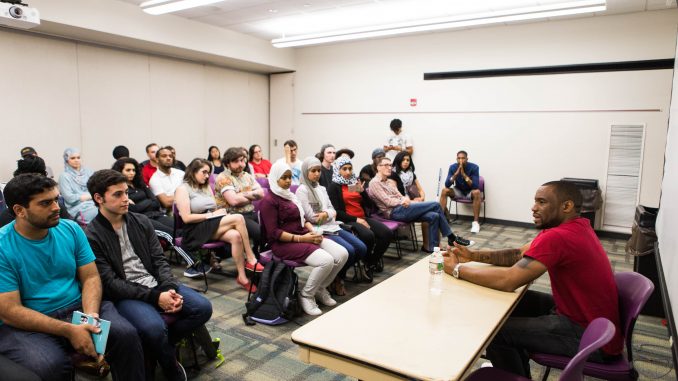
Instead of the normal suit and tie he usually wears while sharing his political commentary, Marc Lamont Hill wore a red graphic T-shirt that read, “#Dreamer,” while he spoke to students on Friday.
Lamont Hill, a CNN commentator and professor, was the speaker at a Students for Justice in Palestine event in the Student Center. He has done advocacy and documentary work in Palestine.
The 2000 College of Education alumnus and former urban education professor comes to the Klein College of Media and Communication as the first Steve Charles Chair in Media, Cities and Solutions — the college’s first endowed chair. Steve Charles, a member of the Board of Trustees and 1980 radio, television and film alumnus, endowed $2 million to create the chair in 2016.
Lamont Hill will teach classes in the Media Studies and Production department in Spring 2018. He’s currently teaching in the College of Education through a secondary appointment.
The event was a discussion on the Israeli-Palestinian conflict. In 1948, Israel declared independence from the British. In 1967, the Six Day War broke out between Israel, Egypt, Jordan and Syria, which ended in a large portion of land — Palestine — falling under Israeli control. Since then, Palestine has not been recognized as its own state and is often persecuted by the Israeli government through its controlling of Palestinian people’s access to products, water and where they are allowed to live.
But Palestinian officials are also guilty of human rights violations, like bombing the Iron Dome, Israel’s air defense system.
Lamont Hill has visited Palestine and does research and activism around Israel’s occupation of Palestine. He’s also a supporter of the Boycott, Divestment, Sanctions Movement against Israel, which is an economic protest against Israeli institutions that support, benefit from or refrain to speak against Israel’s occupation of Palestine. The U.S. has historically been supportive of Israel and its leaders.
He started the Q&A and discussion explaining why he cares about Palestine.
“We fight to stop the kind of occupation of North Philadelphia that Temple engages in,” Lamont Hill said at the event. “I can’t operate purely within the boundaries of America because there are direct connections between the violence we see here and the violence we see around the globe.”
“As a Black person, I can’t be outraged at one thing or two things, I have to be outraged at everything,” he added. “I don’t stop being outraged at injustice when it doesn’t directly affect me.”
He recalled that during one trip he was headed to the West Bank, a territory that was formerly under the control of Palestine, but has been occupied by Israel since 1967. He witnessed as a 60-year-old Palestinian man had to lower his pants for Israeli officers to make sure he wasn’t bringing a bomb with him on his way to work.
Lamont Hill said there is a long tradition of African people, in the United States and worldwide, finding connections with Palestine. For example, Malcolm X talked about fighting the occupation of Palestine in the aftermaths of the 1948 war.
Lamont Hill said he became interested in fighting against police brutality and state violence against African-Americans as a kid growing up in North Philadelphia.
“My friends kept dying,” he said. “I began to develop a critical analysis of the state, of our society itself and that combined with my lived reality of seeing people dying and going to jail and smoking crack. It made me say, ‘I gotta do something,’ so I would just read.”
He said reading Malcolm X’s books changed his life.
Shawn Aleong, a freshman Fox School of Business student, told Lamont Hill that as a Black man with a disability, things can be difficult. He asked Lamont Hill about what he does when people doubt his ability.
Lamont Hill told Aleong that for African-Americans, there’s often an assumption that they aren’t able to accomplish things. He said that being a Black person, or a woman, or an Arab in the U.S. also means constantly being surrounded by doubt.
“I find inspiration that in despite of the doubt…jazz was created…despite them saying we can’t write a book, that we end up with a Toni Morrison or a James Baldwin,” Lamont Hill said.
Anmol Hegde, a senior film and media arts major, asked Lamont Hill about the ethics behind documentary work during international conflicts.
Lamont Hill said that his job, first and foremost, is to be an ally and do what is needed of him from the Palestinian people. He said he’s had dozens of conversations with Afro-Palestinian people that told him they wanted their stories heard.
“I think digital media is made with the possibility, which I think is more interesting, of people telling their own story,” Lamont Hill said. “For me, my biggest goal, and I do this as a researcher too, is to look for spaces and opportunities to create sites of self-narration for folks.”
Amani Nijem, SJP’s president, said the student organization decided to have Lamont Hill speak after hearing about his work in Palestine from Shadia Monsour, a Palestinian activist.
“I thought it went really well,” said Nijem, a senior general science and teaching major, of the event. “A lot of people showed up, very good questions were asked, like Black Palestinian related questions and also connecting [the conflict] to Puerto Rico and Cuba.”
Lamont Hill said there is a lot more activist work needed to be done in both Palestine and in the U.S., but he’s hopeful.
“I’ve never been more confident ever, than in this moment right here right now that we are going to win,” Lamont Hill said.
CORRECTION: This article previously misstated when Marc Lamont Hill begins his teaching appointment. He will begin teaching in the Klein College of Media and Communication’s Media Studies and Production department in Spring 2018, but is currently teaching in the College of Education through a secondary appointment.



Be the first to comment